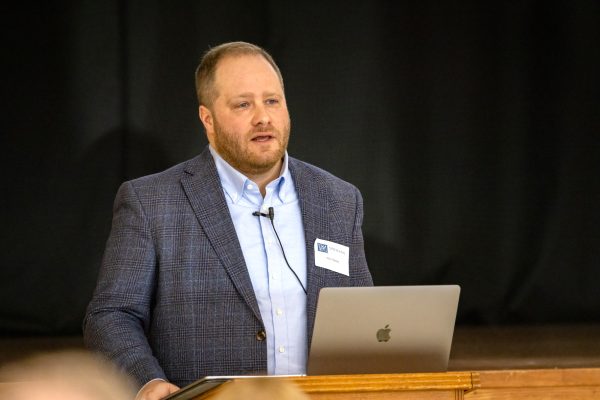Cantors, musicians gather to hear about the diocesan long-term vision for sacred music

Church of the Magdalen hosted a meeting of those involved in liturgical music Saturday, Jan. 28. Publisher and chant composer Adam Bartlett led the event. (Photos courtesy J.D. Benning)
Five parishes are spearheading Bishop Carl A. Kemme’s long-term, diocesan-wide vision for sacred music in the liturgy of the Mass.
Fr. Gabriel Greer said the Cathedral of the Immaculate Conception, Blessed Sacrament, Magdalen, and St. Francis of Assisi parishes in Wichita and Sacred Heart Parish in Colwich are piloting a process to help the faithful participate in the celebration of the Mass even more deeply through reverent music and chant.
The future of liturgical music in the diocese
Fr. Greer, the diocesan director of Worship, said Bishop Kemme outlined three points he wanted for liturgical music in the diocese at an evening with diocesan musicians in September of 2021:
• Bishop Kemme’s first point is the “pride in place” of the organ. “He wants to see the organ flourish in the diocese and to be used in many of the parishes,” Fr. Greer said. “As such, we have several different organ teachers throughout the diocese partnering with schools to help teach organ lessons during the school day.”
• The second point is proper training and catechesis for cantors and choir members.
• The bishop’s third point is the singing of the liturgical text of the Mass.
Adam Bartlett shares his expertise
The second and third points were the focus of a workshop Saturday, Jan. 28, at Church of the Magdalen Parish in Wichita. It was led by Adam Bartlett, the founder and CEO of Source and Summit, a missal publisher and chant composer.
“He has spent a lot of time studying the church’s history of liturgical music, and has set many of the antiphons of the Mass in English to the Gregorian melodies that have been handed down throughout the centuries,” Fr. Greer said. Bartlett had the entire group singing from the very beginning of the workshop, he said.
Those taking part learned about: singing the Order of the Mass, such as the Gloria, which is the dialogue between the priest and the people; the Ordinary of the Mass which includes the Gloria, the Holy, Holy, and the Lamb of God; and about how to sing the antiphons of the Mass to Gregorian melodies.
“That helped bring to a focus Bishop Kemme’s vision of the Mass being sung,” Fr. Greer said. “That’s what Bishop Kemme wants as we continue to renew the liturgy in the diocese, especially as we focus on reclaiming Sunday as the Lord’s Day, setting it apart from every other day of the week.”
Practice makes perfect
The event ended with the group putting what they learned into practice at a Mass that followed the workshop.
The priority in the diocesan pastoral plan using music to Reclaim Sunday as the Lord’s Day will take years to implement, Fr. Greer said. The first step was to help cantors and musicians understand the bishop’s vision. The second will be to educate the priests.
“And then, throughout a series of articles, we hope to expand on what the liturgy is and how liturgical music is different from religious music and certainly different than secular music,” Fr. Greer said. “As Bishop Kemme says, this is going to be a gradual evolution.”
We are already blessed with a beautiful liturgy, he said, “but Bishop Kemme wants to strive for greatness, to take us to the next level.”
